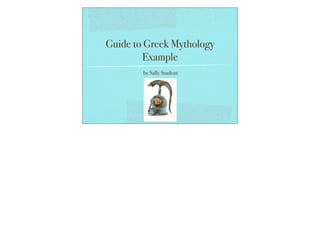
Greek myth example
- 1. Guide to Greek Mythology Example by Sally Student
- 2. Six Elements of Greek Mythology Greek myths are characterized by six elements: 1. Myths create stability in a culture by creating a set of values and history that people can share shared set of perspectives, values, and history. 2. Myths give guidelines for how people should live 3. Myths justify activities of a culture by giving rituals, laws, and social standards for how people act and are treated in society. 4. Myths give meaning to the joyous and painful experiences of life. 5. Myths explain the unexplainable by giving a reason behind phenomena. 6. Myths offer role models for children and adults to look up to. They also offer examples of how not to act.
- 3. Stability In the Greek Flood Myth, Zeus tries to destroy wicked humankind because they have abandoned the gods and turned to cannibalism. A husband and wife, Deucalion and Pyrrha, escaped the flood on a boat. Zeus saw they were good people and saved them from the flood, then allowed them to repopulate the earth by throwing the “bones of their mother” (rocks from Mother Earth) over their shoulders. This myth gives stability by creating a common history for the Greek people
- 4. Guidelines In the myth of Niobe, Niobe the mother of 14 children. At a feast in honor of the goddess Leto, Niobe boasted that Leto only had two children, while Niobe had 14. In revenge, Leto sent her children, Artemis and Apollo, to kill all of Niobe’s children to teach her humility. This story gives humans a guideline for how to live-- never anger or dishonor the gods!
- 5. Justify Activities In the myth of Pentheus, the god Dionysus, the god of wine and madness, wants to exact revenge on Pentheus, who refused to worship Dionysus. Dionysus drives Pentheus mad and rips him limb from limb. This myth justifies activities because worshipers of Dionysus would sacrifice animals by ripping them apart in honor of this myth.
- 6. Give Meaning to Life In the myth of King Oedipus, a prophecy says that Oedipus will kill his father and marry his mother, so his father, the king, abandons him in the woods. A kind shepherd raises him as his own child. Later in life, Oedipus runs into his birth father (whom he doesn’t know is his real father) and kills him in a fight, then marries the queen (Oedipus’s mother). The result puts a curse upon the family. The myth gives meaning to life by explaining that fate is inescapable, and no matter how hard a person tries there will always be bad things that happen in life.
- 7. Explain the Unexplainable Hephaestus was the god of blacksmiths. He forged all of the armor and weapons of the other gods. Hephaestus was said to live in a mountain and when he was working, his might sparks would fly from the mountain and create volcanic explosions. Hephaestus explains the unexplainable by giving a reason for volcanoes.
- 8. Give Role Models The greek hero Theseus risked his own life to end the punishment of his people. He volunteered as a sacrifice to the Minotaur, a half man, half bull monster who lived in an elaborate maze called the Labyrinth. Theseus killed the monster and set his people free from oppression Theseus was a role model because he risked his life to save his people. He valued his countrymen more than his own life.
- 9. Reflection By studying the Greek myths, the values of this group of people is clear. Submission and reverence to the gods is one of the most important aspects of Greek life. In order to be a good Greek, one must keep the gods in the upmost importance and respect. Honor is also important in Greek life. Putting your own life at risk for the sake of glory or freedom for your fellow man brings honor. But if someone is gravely foolish or dishonors the gods, they should be prepared for severe punishment. The gods do not take insults lightly and are likely to torture and kill anyone who insults them!